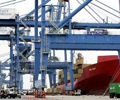Successful Vessel Call Optimization Combines Port And Ship Centric Approaches

On February 24th, 2021, the TRAN Committee of the European Parliament adopted MEP Delli’s report on more efficient and cleaner maritime transport. FEPORT subscribes to the objectives of this report and welcomes the MEPs good appraisal of the main issues at stake.
FEPORT appreciates the recognition by the TRAN MEPs of the efforts deployed by port stakeholders and values their call on the Commission to draw up a strategy on zero-emission ports and to take swift action to regulate EU port access for the most polluting ships based on the Port State Control Directive framework.
The draft resolution also highlights other measures that could significantly contribute to the decarbonization of the maritime sector and the reduction of shipping emissions at sea (such as vessels speed optimization, including slow steaming, optimization of navigable routes, etc.) and in ports.
With respect to port/vessel call optimization, FEPORT underlines the need to have good insights into the concept and an extensive knowledge of all existing initiatives that have been deployed to improve port/ship communication and optimize the calls to the benefit of ports stakeholders and ship operators.
An efficient vessel call relies on mutual understanding from ship and port stakeholders of each others’ functioning and constraints. Both port centric and ship centric approaches to vessel/port call optimization are needed to conceive models of communication and data sharing that enhance predictability for both sides. This is already the model that is implemented by existing vessel coordination centres.
Far from optimization however, late arrivals of ships, no shows (blank sailings) and low schedule reliability have tremendous negative effects not only on port terminals but on a whole range of port stakeholders and actors of the maritime logistics chain. The disruption in the organization resulting from a low schedule reliability is also detrimental to sustainability and decarbonization efforts and should therefore be avoided as much as possible.
2020 has not been a year of good practice in terms of schedule reliability in the container sector and the congestion that has resulted in ports should also be part of the discussion on vessel call optimization.
FEPORT has elaborated a position paper on this important topic that you can find at the bottom of the press release on our website and looks forward to having interesting exchanges with all interested parties.
Source: FEPORT

 Hellenic Shipping News Worldwide Hellenic Shipping News Worldwide, Online Daily Newspaper on Hellenic and International Shipping
Hellenic Shipping News Worldwide Hellenic Shipping News Worldwide, Online Daily Newspaper on Hellenic and International Shipping






















 PG-Software
PG-Software